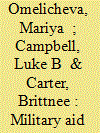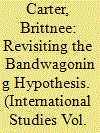| Srl | Item |
| 1 |
ID:
152858


|
|
|
|
|
| Summary/Abstract |
MARIYA OMELICHEVA, BRITTNEE CARTER, and LUKE B. CAMPBELL assess the relationship between U.S. security assistance programs and the degree to which foreign militaries respect civilian human rights in times of political instability. They conclude that these programs do not have a uniform impact on human rights practices in the states that receive U.S. military aid. Rather, the relationship is contingent upon various factors, primarily whether security assistance programs include an educational and training component.
|
|
|
|
|
|
|
|
|
|
|
|
|
|
|
|
| 2 |
ID:
185152


|
|
|
|
|
| Summary/Abstract |
Early theories of alliance formation often focus on when great power or status quo states will enter into military alliances. However, revisionist powers, seeking to threaten the international order igniting global security concerns, often draw power from their alliances with small regional neighbours and weak states. Though several studies discuss indicators that may potentially drive these weak states to bandwagon with revisionist powers to the detriment of protecting status quo security interests, many of these theories have yet to be tested empirically, let alone be presented and tested within the same study. This research empirically tests the conditions under which weak states will form bandwagoning alliances with aggressor states. The results demonstrate that weak states will form bandwagoning alliances with neighbouring regional aggressors, when facing an external threat, and especially under conditions of internal duress or domestic political strife. In order to protect global security interests and to keep aggressor and revisionist states from gaining power and influence through bandwagoning alliances, status quo states should identify internally destabilized weak states and offer early assistance in state building and increasing bureaucratic capacity.
|
|
|
|
|
|
|
|
|
|
|
|
|
|
|
|